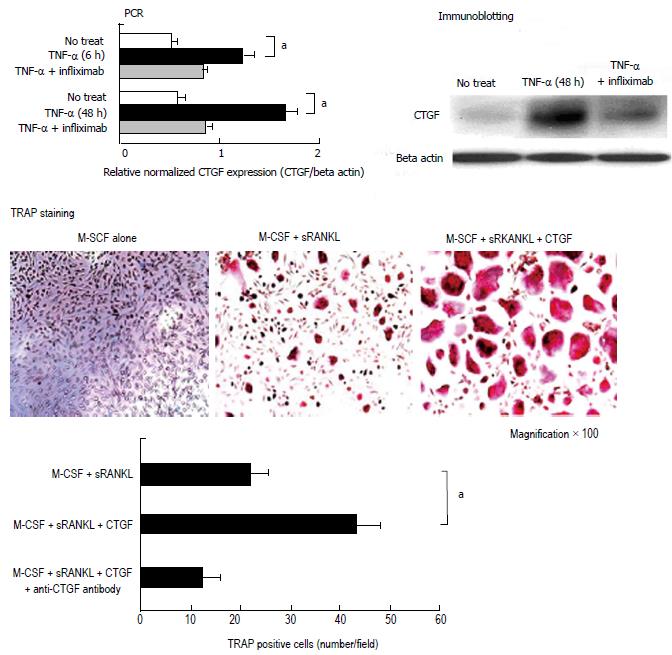Copyright
©2014 Baishideng Publishing Group Inc.
World J Orthop. Nov 18, 2014; 5(5): 653-659
Published online Nov 18, 2014. doi: 10.5312/wjo.v5.i5.653
Published online Nov 18, 2014. doi: 10.5312/wjo.v5.i5.653
Figure 3 Connective tissue growth factor enhanced macrophage-colony stimulating factor/ receptor activator of nuclear factor kappa-B ligand mediated osteoclastgenesis.
Figure 3 Shows images of tartrate-resistant acidic phosphatase (TRAP) staining and the number of TRAP positive cells. For the evaluation of osteoclastogenesis, CD14+ were purified from peripheral blood mononuclear cells of healthy volunteers to obtain osteoclastic progenitor cells. Osteoclasts were induced with macrophage-colony stimulating factor (M-CSF) and soluble receptor activator of nuclear factor kappa-B ligand (sRANKL) and the osteoclastgenesis was evaluated by TRAP staining. The TRAP positive cells were defined as osteoclasts. Connective tissue growth factor (CTGF) alone could not help in the differentiation of osteoclasts (data not shown). M-CSF/RANKL-mediated osteoclastogenesis was enhanced, which was detected by the production of CTGF by larger and higher number of osteoclasts; this enhancing effect was abolished by anti-CTGF antibody. The bars in Figure 2 indicate the standard deviation. Statistical analysis (paired t test) was performed, and P values < 0.05 were considered to be statistically significant. aP < 0.05, M-CSF + sRANKL + CTGF vs M-CSF + sRANKL.
- Citation: Nozawa K, Fujishiro M, Takasaki Y, Sekigawa I. Inhibition of rheumatoid arthritis by blocking connective tissue growth factor. World J Orthop 2014; 5(5): 653-659
- URL: https://www.wjgnet.com/2218-5836/full/v5/i5/653.htm
- DOI: https://dx.doi.org/10.5312/wjo.v5.i5.653









